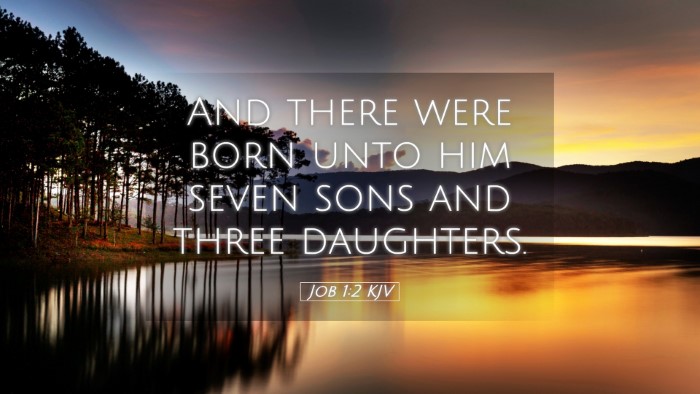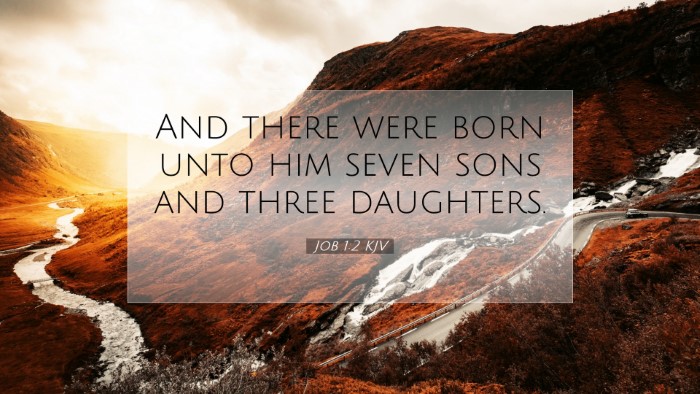Old Testament
Genesis Exodus Leviticus Numbers Deuteronomy Joshua Judges Ruth 1 Samuel 2 Samuel 1 Kings 2 Kings 1 Chronicles 2 Chronicles Ezra Nehemiah Esther Job Psalms Proverbs Ecclesiastes Song of Solomon Isaiah Jeremiah Lamentations Ezekiel Daniel Hosea Joel Amos Obadiah Jonah Micah Nahum Habakkuk Zephaniah Haggai Zechariah MalachiJob 1:2
Job 1:2 KJV
And there were born unto him seven sons and three daughters.
Job 1:2 Bible Commentary
Commentary on Job 1:2
Job 1:2 states, "And there were born unto him seven sons and three daughters." This verse serves as an introduction to the character and prosperity of Job. A detailed analysis from several public domain commentaries provides valuable insights into its implications.
Overview of Job's Family
Job's family is presented here with specific numbers: seven sons and three daughters. The numerical symbolism is significant, as the number seven often represents completeness and perfection, while three can signify wholeness or the divine.
Commentary from Matthew Henry
Matthew Henry notes that Job's large family indicates both his wealth and societal status. He highlights that having many children in ancient times was regarded as a blessing from God and a sign of His favor. The emphasis on the exact number of children also suggests that Job's family life was a crucial aspect of his identity.
Insights from Albert Barnes
Albert Barnes complements this understanding by pointing out the significance of Job being a "great man," which is supported by the mention of his children. They not only reflect his prosperity but also allude to his character as a father. He suggests that such a family unit implies potential for both companionship and conflict, presenting a fuller picture of Job's life.
Analysis by Adam Clarke
Adam Clarke offers a deeper examination of the familial aspect depicted in this verse. He proposes that the children symbolize more than wealth; they represent the joys and responsibilities of family life. Clarke notes that Job's mindfulness in raising his children reflects his righteousness and commitment to God. Moreover, the fact that the sons are mentioned before the daughters aligns with cultural norms of that era.
Theological Implications
The introduction of Job's family raises important theological reflections. As pastors, students, and scholars, it invites contemplation on God’s providence and the nature of blessings. Job's existence amid apparent divine favor underscores a theme prevalent throughout the Book of Job—reconciliation of human suffering with divine sovereignty.
Divine Favor and Human Existence
The portrayal of Job as a father of many indicates God’s manifold blessings. However, this raises the question of why such a sufferer would be introduced as a person of such great material wealth. This paradox encourages a nuanced understanding of spiritual blessings versus earthly ones.
The Role of Family in Suffering
Job's steadfastness in the face of trials also brings into focus the impact of family. The strength derived from familial bonds acts as a foil to the suffering Job ultimately faces, reinforcing the theme of community in times of distress. This calls for pastoral reflections on the importance of family and communal support in the lives of believers.
Concluding Thoughts
In conclusion, Job 1:2 encapsulates several critical themes that resonate through the rest of the book. The mention of Job's family sets the tone for exploring wealth, suffering, faith, and the human experience. By reflecting on the insights provided by Matthew Henry, Albert Barnes, and Adam Clarke, we can appreciate the depth contained within this simple yet profound detail of Job's family life.
Reflection Questions
- What does the portrayal of Job’s family suggest about God’s blessings and human experience?
- How can we apply the notion of familial responsibility and leadership illustrated in Job's life to our contemporary contexts?
- In what ways can the church foster supportive family structures that reflect the biblical ideals presented in Job?


